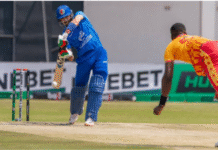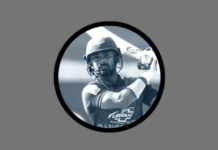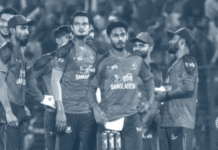-
Argentina’s Lionel Messi (L) smiles during a training session at the arena di Corinthians stadium in Sao Paulo, July 8, 2014. Reuters
The Netherlands are one win away from a second straight World Cup final while opponents Argentina head into Wednesday’s last-four clash looking to end their 24-year wait for a place in the biggest game of all.
Two teams with a rich tradition and an abundance of motivation should produce a close game, characterised by tight marking, disciplined defence and threats on the break as they bid to reach the July 13 final at Rio de Janeiro’s Maracana.
But for all the expectation, all the history and all the focus on the tactical approaches of Alejandro Sabella and Louis van Gaal, the clash at the Corinthians arena is likely to come down to how two individuals seize the moment.
With both teams set to pack the midfield, regardless of what formal formation they field, Argentine Lionel Messi and Dutchman Arjen Robben will be charged with producing thrilling moments of skill that could decide who heads to Rio for the final.

Argentina’s Lionel Messi (L) smiles during a training session at the arena di Corinthians stadium in Sao Paulo, July 8, 2014. Reuters
The narrative around the 27-year-old Messi’s stature in the game has long suggested that the four-time World Player of the Year needs to take his country to a World Cup triumph to enter the list of the game’s true greats.
Whether that assessment is fair or not, Messi is certainly doing his best to prove that he deserves to be mentioned in the same breath as compatriot Diego Maradona and Brazil’s Pele.
The forward has four goals, all in the group stage, but his contribution has gone well beyond finding the back of the net.
Messi has always had the ability, for Barcelona and Argentina, to drop away from the opposing back-line and run at defences from deep, but in the quarter-final win over Belgium he played almost as a classic playmaking number 10.
In this withdrawn role, Messi successfully controlled the tempo of the game, slowing it down when needed and probing for spaces for striker Gonzalo Higuain to exploit.
Conductor Messi
So often the virtuoso who provides the dramatic crescendo to an attack, Messi has evolved in this tournament into the conductor of the orchestra.
The absence of Angel Di Maria on the right through injury is a blow for Argentina because the Real Madrid winger has provided the other main attacking threat for Sabella’s team.
It will be interesting to see whether the Argentine coach goes with the defence-minded Enzo Perez, who replaced Di Maria against the Belgians, or goes for a more attacking option.

Netherland’s Arjen Robben warms up during a training session at the Pacaembu stadium in Sao Paulo July 8, 2014. Reuters
His Dutch counterpart Van Gaal has been willing to adjust his lineup and formation for each game, but the one constant is the reliance on Robben to terrorise defences with his high-speed dribbling.
While much attention has focused on the tricky winger’s tendency to go down easily in seeking penalties, that has distracted somewhat from the way his pace, directness and shooting have been the main focus of the Dutch attacks.
Van Gaal’s side have cut it fine on the route to the semi-finals though – they needed penalties to get past Costa Rica in the quarter-finals having only beaten Mexico by a controversial last-minute penalty in the previous round.
They will need striker Robin van Persie to recapture his form from the group stage to give the Argentina defence something else to ponder apart from Robben’s direct threat.
The two teams have met four times before in the World Cup, including in the 1978 final which Argentina won 3-1 after extra time on home soil. That was their only win over the Dutch at the finals having lost twice and drawn once in the other matches.
Statbox
Where: The Corinthians arena, Sao Paulo Capacity: 62,601
When: Wednesday, July 9, 17:00 local (2000 GMT/2 a.m. BdST, Jul 10)
Probable teams:
Netherlands: 1-Jasper Cillessen; 3-Stefan de Vrij, 2-Ron Vlaar, 4-Bruno Martins Indi, 15-Dirk Kuyt, 5-Daley Blind; 11-Arjen Robben, 20-Georginio Wijnaldum, 10-Wesley Sneijder; 9-Robin van Persie, 21-Memphis Depay
Argentina: 1-Sergio Romero; 4-Pablo Zabaleta, 15-Martin Demichelis, 2-Ezequiel Garay, 16-Marcos Rojo; 14-Javier Mascherano, 6-Lucas Biglia, 8-Enzo Perez; 22-Ezequiel Lavezzi, 9-Gonzalo Higuain, 10-Lionel Messi
Key stats:
While Argentina have won the World Cup twice (1978, 1986), the Dutch are perennial underachievers in the tournament having reached three finals but coming away empty-handed each time (1974, 1978, 2010).
The teams met in the controversial 1978 final, which kicked off late after hosts Argentina objected to a plaster cast on the forearm of Dutch player Rene van de Kerkhof.
Argentina won the final 3-1 after extra time.
There have been four previous meetings at the World Cup between the sides – the Netherlands winning two, Argentina one – in the ’78 final – and one draw.
The Netherlands, with 12 goals, are joint top scorers in the 2014 tournament with Colombia, who have already been eliminated.
Lionel Messi has scored four of Argentina’s eight goals, while Dutch forwards Arjen Robben and Robin van Persie have each notched three.
With their 1-0 quarter-final win over Belgium, Argentina equalled their longest World Cup winning streak of five games. All five victories have been by one-goal margins.
Previous meetings: The teams have played each other eight times overall, with the Netherlands winning four, Argentina one and three draws.
World Cup meetings: 1974 Second round: Netherlands 4 Argentina 0, 1978 Final: Argentina 3 Netherlands 1, 1998 Quarter-finals: Netherlands 2 Argentina 1, 2006 Group stage: Argentina 0 Netherlands 0
Results so far at the 2014 World Cup:
Netherlands: Opened their campaign with a 5-1 mauling of defending champions Spain before beating Australia 3-2 and Chile 2-0 to top Group B. They staged an astonishing fightback to beat Mexico 2-1 in the last 16, equalising with two minutes left on the clock before getting the winner via the penalty spot in stoppage time. Despite dominating Costa Rica in Saturday’s quarter-final, the Netherlands needed a penalty shootout to secure a place in the semi-finals.
Argentina: Laboured to a 2-1 win over Bosnia in their opening game, scraped a 1-0 win over Iran in stoppage time and beat Nigeria 3-2 to finish top of Group F. Needed an extra-time goal in their last 16 match to beat Switzerland 1-0, then wrapped up their quarter-final against Belgium by the same scoreline.
Head-to-head statistics at this tournament:
Games played: Netherlands 5, Argentina 5
Goals scored: Netherlands 12, Argentina 8
Fouls committed: Netherlands 91, Argentina 54
Yellow cards: Netherlands 7, Argentina 5
Red cards: Netherlands 0, Argentina 0
Team stats:
Distance run per match: Netherlands 114.8km, Argentina 109.6km
Passes completed: Netherlands 2,031, Argentina 2,438
Pass completion rate: Netherlands 80 pct, Argentina 80 pct
Penalty shootout record: In their two World Cup shootouts, the Netherlands lost in the semi-finals of the 1998 tournament to Brazil, and beat Costa Rica in the 2014 quarter-finals. Argentina survived two shootouts in 1990, beating Yugoslavia and Italy in the quarter- and semi-finals. They won another in 1998 when they eliminated England in the second round, and suffered their first defeat in the 2006 quarter-finals to Germany.
Source: Bd news24










